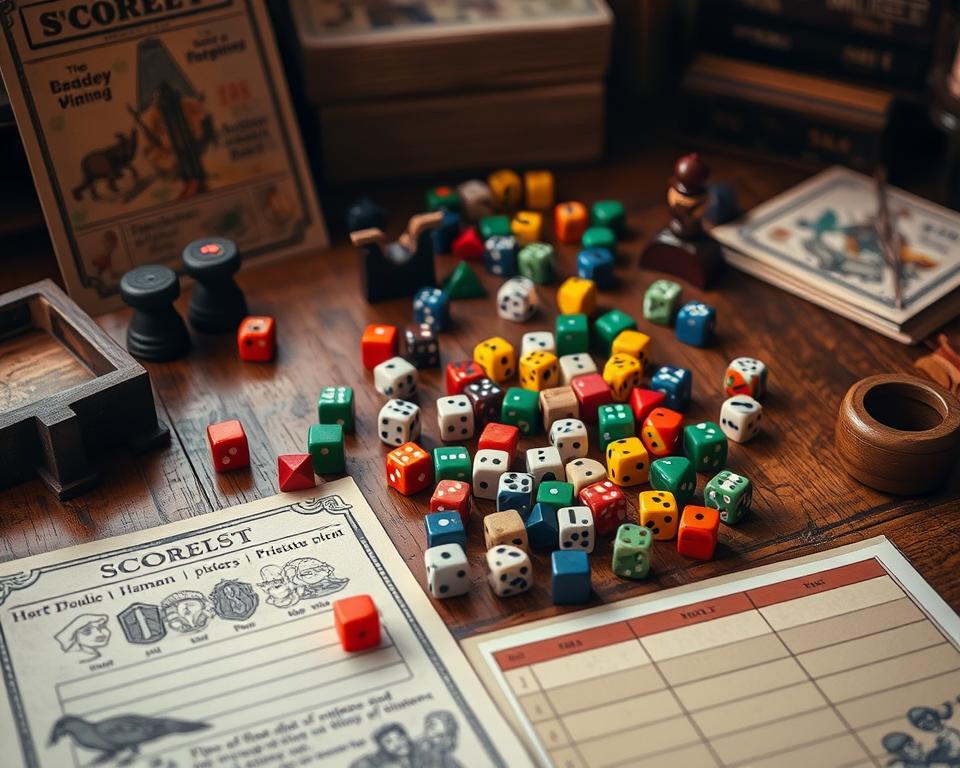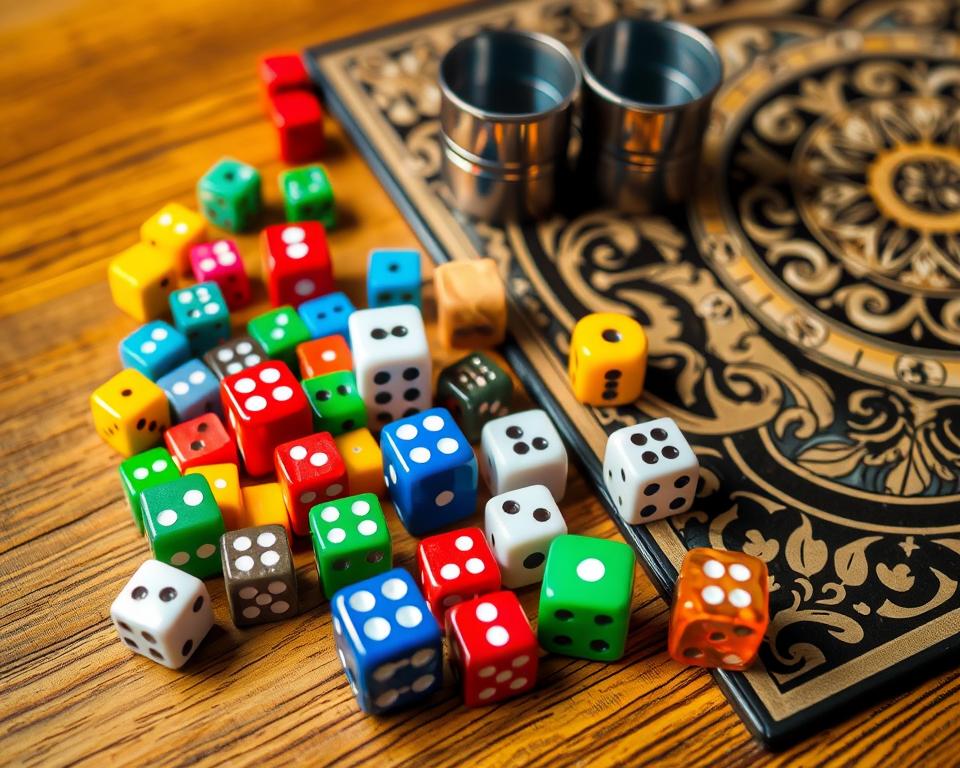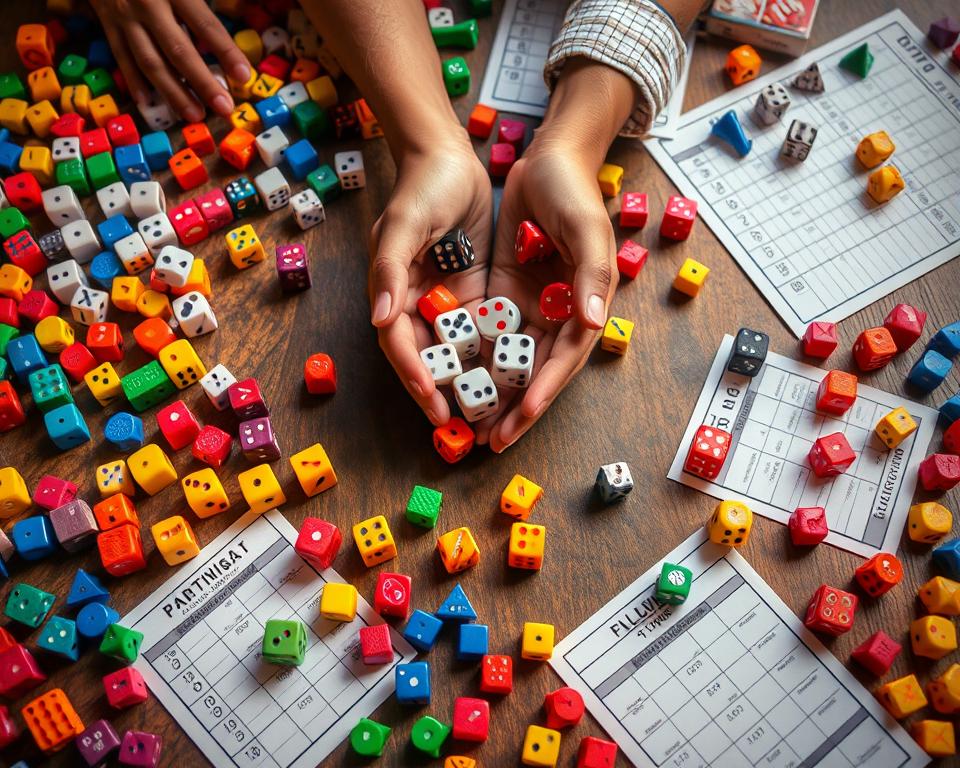Dice games have been thrilling players for centuries. They mix chance, strategy, and friendship. Whether you’re experienced or new, knowing the rules is key to enjoying these games. This guide will cover the basics, popular types, and strategies to improve your game.
This article will cover everything from the basic materials to scoring systems. You’ll learn about the history and evolution of dice games. Plus, you’ll discover the etiquette and rules that make these games fun.
By the end, you’ll know how to play dice games with confidence. Whether it’s with friends, family, or at a casino, you’ll be ready.
So, let’s start playing and learn the secrets of dice games. Get ready for a journey filled with suspense, strategy, and excitement.
What are the Rules of the Dice Game
Dice games are fun and popular. They involve rolling dice to see who wins. Knowing the rules is key for all players.
Dice games use standard six-sided dice. Each side has a number from 1 to 6. Players aim to roll certain patterns to score points.
- The basic objective of dice games is to roll specific combinations or patterns with the dice.
- The number of dice used can range from a single die to multiple dice, depending on the game.
- Scoring systems in dice games often reward players for achieving certain dice combinations or patterns.
Dice game rules vary, but the basics stay the same. Rolling dice and achieving outcomes is common. Learning these rules is the first step to becoming good at dice game play.
“The key to winning at dice games is to understand the rules and practice your rolling techniques.”

Whether you’re new or experienced, knowing the rules is crucial. It’s important for enjoying and winning at these games.
Understanding the Basics
Exploring dice games starts with knowing the basics. You need the right materials and setup. Let’s look at what makes these games exciting.
Dice Game Materials
The heart of any dice game is the dice. Most are six-sided, showing numbers 1 to 6. But, some games use special dice like d4, d8, or d20. The type of dice changes the game’s feel and chances.
Games also use boards or tables to keep track of scores. These can be simple or very detailed. You might also need chips, markers, or score sheets. These are all part of the dice game materials needed to play.
Setting Up the Game
Getting the game ready is key for fun. Here’s how to do it:
- Place the game board in the middle, making sure everyone has room to roll dice and reach everything.
- Give each player their dice, game pieces, and other needed items.
- Make sure everyone knows the rules and goals of the game.
- Decide who goes first or how turns are ordered, following the game’s rules.
By carefully setting up the dice game, players can enjoy the game’s strategy and excitement.

Popular Dice Game Variations
The world of dice games is full of variety and excitement. There are many different games to choose from, each with its own unique charm. Whether you love classic games or enjoy new twists, there’s something for everyone.
Yahtzee is a timeless favorite that many players adore. It’s all about rolling dice and trying to score points in different ways. The thrill of getting a “Yahtzee” is what makes it so addictive.
- Craps is another classic that’s loved by many. It’s fast-paced and involves betting on the outcome of rolling two dice. The rules and betting options add to the fun.
- Farkle offers a modern take on dice games. It’s all about taking risks and trying to score big. The game is exciting and full of surprises.
These games are just a few examples of the many dice games out there. From old favorites to new ones, there’s a game for every taste. Whether you’re a fan of classics or modern twists, there’s something for you.
“The beauty of dice games lies in their ability to create a sense of anticipation and excitement with every roll.” – Dice Game Enthusiast
Roll the Dice Rules
Mastering the art of rolling the dice is key to winning in any dice game. Whether you’re playing roll the dice rules, exploring dice game rolling techniques, or diving into dice game scoring systems, knowing how to roll the dice right can change your game. We’ll explore the details of dice rolling and share strategies to improve your game.
Rolling Techniques
The way you hold and release the dice affects the outcome. Dice game rolling techniques like the backhand toss, underhand roll, and straight-arm throw each have their own benefits. Try out different methods to find what works best for you and gives you control over the dice.
Scoring Systems
Dice games use different dice game scoring systems to decide who wins. From simple points to complex math, knowing the scoring rules is vital. Learn the unique features of each game and how to boost your score with smart dice rolling and choices.
“The key to winning at dice games is not just luck, but a combination of skill, strategy, and a deep understanding of the rules and mechanics.”
Rolling the dice well is about technique, strategy, and being flexible. By learning the basics and exploring the details of roll the dice rules, you’ll become a skilled player in dice games.
Dice Game Strategies
Learning how to play dice games well is crucial. It doesn’t matter if you’re experienced or just starting out. Knowing the right strategies can make a big difference in your game.
One key part of winning is understanding the odds. By knowing the chances of different outcomes, you can make better choices. This helps you pick the best moves and avoid big risks.
Being adaptable is also vital. Dice games can be unpredictable, and changing your strategy quickly can help you win. Knowing the game’s flow, your opponents’ moves, and the current situation can lead to success.
- Manage your risk wisely: Dice games are all about chance, but smart risk-taking can boost your wins. Learn when to play safe and when to take a risk.
- Use strategic positioning: Knowing where to place your pieces or bets is key. It can give you an edge and limit what your opponents can do.
- Master bluffing techniques: In some games, fooling your opponents can be a strong strategy. Learn to read the game and bluff well to outsmart your opponents.
“The key to winning dice games is not just luck, but a well-crafted strategy that combines probability analysis, adaptability, and strategic thinking.”
By learning these strategies, you’ll improve your dice game skills. This will increase your chances of winning in the exciting world of dice games.
Dice Game Terminology
Exploring dice games introduces you to a special vocabulary. This list helps you understand the most common terms and their meanings.
Common Terms Explained
Knowing the language of dice games is key for all players. Let’s look at some important terms you’ll find:
- Craps – A well-known dice game where bets are placed on the outcome of dice rolls.
- Yahtzee – Involves rolling five dice to get certain combinations, like three-of-a-kind.
- Roll – Throwing the dice and seeing the results.
- Point – The number rolled that becomes the goal for future rolls in craps.
- Pass Line – A bet in craps that the shooter will win.
- Come-out Roll – The first roll of a round in craps.
- Pip – The dots on a die’s face.
- Pair – Two dice showing the same number of dots.
Learning these common dice game terms will make playing these games more fun and clear.
How to Play Dice Games
Dice games are exciting and fun, whether you’re with friends, family, or alone. If you’re new to how to play dice games, don’t worry! This guide will help you start your journey into the world of dice game instructions.
You’ll need a set of six-sided dice to begin. The number of players can change based on the game. Once you have your dice and players, it’s time to start the game.
- Choose a game like Craps, Yahtzee, or Farkle.
- Learn the game’s goal and how to score.
- Make any house rules or changes you want.
- Roll the dice one at a time, following the game’s rules.
- Track scores and find out who wins according to the game’s rules.
Practicing and understanding how to play dice games is key. Try different games, learn strategies, and most importantly, have fun!
“The true secret of happiness lies in taking a genuine interest in all the details of daily life.” – William Morris
By following these steps, you’ll become a dice game expert. Enjoy the excitement of rolling dice, plan your moves, and have fun with friends or family. Happy gaming!
The History of Dice Games
Dice games have a long and fascinating history. They started in ancient times, with the Egyptians, Greeks, Chinese, and Romans all playing them. These games were more than just fun; they were a way to connect with others and even held spiritual value.
Ancient Dice Games
The first dice were found in ancient Mesopotamia, around 3000 BC. They were made from bones, stones, or ivory. These early dice were used in games of chance.
As time went on, dice games spread across the ancient world. Each culture added its own twist to these games. In ancient Egypt, Senet was played on a board with squares that showed different outcomes. The Greeks and Romans had their own games, like Alea and Ludus Duodecim Scriptorum, which were more complex.
Modern Dice Game Evolution
As societies changed, so did dice games. The 17th and 18th centuries saw a rise in games like Craps and Backgammon. These games led to many modern versions, each with its own rules and strategies.
Today, dice games are enjoyed by people everywhere. From the excitement of casino games to the fun of family games, dice games are still loved. The dice game history shows how these simple tools have captured our hearts for thousands of years.
“Dice, of all objects, are the most suggestive of chance and uncertainty. A throw of the dice is a test of fortune, a little drama of hope and fear.”
– Bertrand Russell
Dice Game Instructions
Learning to play dice games is fun and easy. Whether you’re new or experienced, these guides will help you enjoy dice game instructions and how to play dice games.
First, let’s look at what you need to start a game:
- Dice (usually 6-sided, but some games use different types)
- Game board or playing surface (optional, depending on the game)
- Scoring markers or chips (to track points)
- Possibly, additional game-specific components like cards or tokens
With the right stuff, it’s time to learn the game’s rules and gameplay. You’ll need to know the goal, how to score, and any special moves. Games like Yahtzee, Craps, and Farkle each have their own rules to learn.
“The key to mastering dice games is to start with the basics and gradually build your understanding of the game’s mechanics.”
By following the dice game instructions and practicing, you’ll get better and more confident. Learning how to play dice games can lead to lots of fun and strategic thinking with friends and family.
Dice games are simple and fun for everyone. With some guidance and a lot of excitement, you can explore the world of dice game instructions and find many exciting games.
Dice Game Variations
The world of dice games is vast and diverse. It has a rich tapestry of regional variations that add depth and character. From Asia’s bustling streets to Latin America’s sun-drenched plazas, there’s a wide range of games to explore. Each has its own rules, scoring systems, and cultural influences.
Regional Variations
Dice games reflect the traditions and customs of different cultures. In Asia, you might find games with intricate scoring systems and elaborate rituals. In the Middle East, versions focus on strategy and probability.
In the Americas, games reflect local community spirit. The Caribbean has Backgammon-inspired games, while South America loves intricate Ludo-style games. Europe offers a mix, from fast-paced Yahtzee in Scandinavia to contemplative Farkle in Central Europe.
Exploring regional dice game variations is a unique and enriching experience. It shows the diversity and evolution of this universal pastime. By understanding cultural influences and distinctive features, players can appreciate the richness of dice games.
“The beauty of dice games lies in their ability to transcend borders and bring people together through the shared experience of rolling the dice and testing their luck.”
Mastering Dice Game Strategies
To get better at dice games, you need to learn advanced strategies. Whether you’re new or experienced, knowing these tactics can help you win more. It’s all about improving your skills.
Leveraging Probability and Risk Management
For those who love dice games, knowing probability is key. By studying the odds, you can make smart bets. Learning to balance risk and reward is crucial for success.
Employing Strategic Betting Patterns
Experts use special betting patterns to win. They adjust bets, use certain combinations, and guess what others will do. Learning to bet strategically can lead to more wins and less loss.
Honing Specialized Techniques
Advanced strategies include special techniques like:
- Precision dice control: Controlling the dice to affect the roll
- Optimal positioning: Placing bets to get the best return
- Deception and bluffing: Using tricks to confuse opponents
By using these techniques, you can beat others and win more often.
“Mastering dice game strategies is not just about chance; it’s about understanding the intricate interplay of probability, risk, and strategic decision-making.”
Improving at dice games takes time and effort. With hard work and a desire to learn, you can become a top player. You’ll win in tough games too.
Dice Game Etiquette
Playing dice games is more than just rolling dice and keeping score. It’s about following certain rules and norms that make the game fun for everyone. Knowing dice game etiquette is key for both new and experienced players of how to play dice games.
Sportsmanship is a big part of dice game etiquette. Players should be respectful and gracious, win or lose. Winning with grace and losing with dignity helps keep the game friendly and competitive.
Table manners are also vital in dice games. Keeping the area clean and avoiding disruptions are important. Also, players should not use electronic devices or talk too much during the game.
Understanding the group’s social expectations is another key part of dice game etiquette. Some games have special customs or traditions. Players should respect these, like following betting limits or hand signals.
By following dice game etiquette, players make the game fun and welcoming for everyone. This improves the gaming experience and builds a sense of community and friendship among players.
“The true test of a man’s character is how he plays the game.” – Grantland Rice
In summary, dice game etiquette is crucial for how to play dice games. It goes beyond the game’s rules. By following these guidelines, players can make the game a positive and inclusive place for everyone.
Conclusion
In this article, we’ve dived into the exciting world of dice games. We’ve covered the basic rules and different types of games. We’ve also looked into their history and strategies.
Now, you know a lot about dice games. Whether you’re new or experienced, you can play with confidence. You’ll know how to follow the rules of the dice game, dice game rules, and how to play dice games.
Learning the dice game instructions and strategies will help you play complex games easily. As you play more, remember to use the right terminology and follow etiquette.
Knowing the history of dice games and popular ones worldwide will deepen your appreciation. Let the excitement of the dice roll lead you to become a better gamer.



